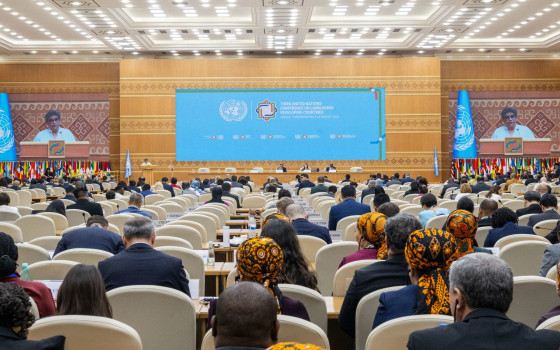
Landlocked but not marginalized: The UN Summit in Turkmenistan concludes with a bold roadmap. Held under the theme "Advancing Progress through Partnerships"

- Europe and Arabs
- Saturday , 9 August 2025 9:44 AM GMT
OASA - New York: Europe and the Arabs
The Third United Nations Conference on Landlocked Developing Countries concluded its activities on Friday in OASA, Turkmenistan, with participants adopting a historic political declaration aimed at accelerating sustainable development and strengthening resilience in 32 countries lacking direct access to the sea. According to the UN Daily News Bulletin, a copy of which we received this Saturday morning, the conference, held under the theme "Advancing Progress through Partnerships," lasted four days. It brought together heads of state, senior UN officials, development partners, and private sector leaders to address the persistent challenges facing these countries, including high trade costs, poor infrastructure, and vulnerability to climate change.
In accordance with the OASA Programme of Action for 2024-2034, adopted by the UN General Assembly last year, the new "OASA Declaration" outlines a unified strategy across five priority areas:
1. Structural economic transformation;
2. Trade and regional integration;
3. Transport and infrastructure;
4- Climate change adaptation and disaster risk reduction;
5- Mobilizing financing and partnerships.
Rabab Fatima, Under-Secretary-General of the United Nations, noted: "The OASA Declaration represents a turning point. It is a plan of action, not just words. Through targeted investments in infrastructure, trade facilitation, and climate resilience, we can unleash the potential of landlocked countries and ensure that no one is left behind."
Ms. Fatima, who serves as the United Nations High Representative for the Least Developed Countries, Landlocked Developing Countries, and Small Island Developing States, added that the conference will be a defining moment for landlocked developing countries, heralding a new era of bold partnerships and decisive action.
She continued: "Solidarity, partnership, and a shared purpose will carry us forward, to a future where geography does not divide us, but where ideas, trade, and innovation unite us. Let us transform 'land connectivity' from a phrase into a new way of life." She affirmed that the United Nations is ready to support this decade of achievements. A Call for Investment and Inclusion
The Declaration calls for increased investments by multilateral development banks, enhanced South-South cooperation, and greater integration of the interests of landlocked developing countries into global trade and climate action agendas.
It also emphasizes the importance of monitoring implementation and ensuring that landlocked developing countries themselves lead the process, under the coordination of the Office of the High Representative for the Least Developed Countries, Landlocked Developing Countries, and Small Island Developing States.
Turkmenistan's Initiatives
As host country, Turkmenistan has presented several initiatives that support the conference objectives, including the Global Atlas for Sustainable Transport Connectivity, the Global Hydrogen Energy Transition Program, and the Caspian Sea Environmental Initiative.
Gurbanguly Malikgulyevich Berdimuhamedov, National Leader of the Turkmen People and Chairman of the Majlis of the People of Turkmenistan, said: "The Awaza Declaration reflects our shared vision of partnership and progress. Together—transit countries, development partners, and the private sector—we can overcome geographical constraints and build sustainable prosperity for our people."
The OASA Declaration represents significant progress for landlocked developing countries and a new symbol of global solidarity, transforming geographical barriers into shared advantage.
The UN General Assembly will follow up on its implementation through the annual ministerial meetings of landlocked developing countries.
The upcoming major platforms for advancing the priorities of landlocked developing countries will include:
• The 2025 UN Climate Conference in Brazil (COP30);
• The next meeting of the United Nations Conference on Trade and Development (UNCTAD);
• The 2027 Global Mountain Summit in Kyrgyzstan.
A mid-term review of the OASA Programme of Action is scheduled for 2030.
At the closing press conference, Aksoltan Ataeva, Permanent Representative of Turkmenistan to the United Nations, said that her country "is not only hosting the third conference of landlocked developing countries, but also reflects Turkmenistan's foreign policy philosophy: to be a bridge, not a barrier." Dmitry Shlabachenko, the UN Resident Coordinator in Turkmenistan, told UN News that the conference was particularly important for the region, as it brought together several heads of state from Central Asia.
Mr. Shlabachenko shared an example cited by the UN Secretary-General during his meetings with Central Asian leaders:
"Before Portugal and Spain joined the European Union, trade between them was virtually non-existent. After accession, 40% of Portugal's exports went to Spain, improving the lives of both peoples. This is an important lesson to remember as we talk about Central Asia."
He concluded by saying, "There is still much to be done, but we are moving in the right direction."
Amanda Khosi Mukwachi, the UN Resident Coordinator in Lesotho, a landlocked African country, stated that the country is willing to share its abundant water and other resources, but it needs investment. She added, "Lesotho has water resources. It is one of its most important natural resources, as huge quantities of water flow from it, saving lives in neighboring countries like Namibia, Botswana, and others." She added, "What they are seeking is investment to develop infrastructure so they can produce renewable energy and hydropower." She added that Lesotho could use its wind and solar energy resources not only for its own industrial development, but also for export to regions facing water and energy challenges.
These and other ideas were discussed on the sidelines of the conference and will continue to be discussed in future forums.
The list of countries classified as landlocked developing countries is:
Azerbaijan, Afghanistan, Armenia, Bhutan, Bolivia, Botswana, Burkina Faso, Burundi, Central African Republic, Chad, Eswatini, Ethiopia, Kazakhstan, Kyrgyzstan, Lao People's Democratic Republic, Lesotho, Malawi, Mali, Mongolia, Nepal, Niger, North Macedonia, Paraguay, Republic of Moldova, Rwanda, South Sudan, Tajikistan, Turkmenistan, Uganda, Uzbekistan, Zambia, and Zimbabwe.












No Comments Found